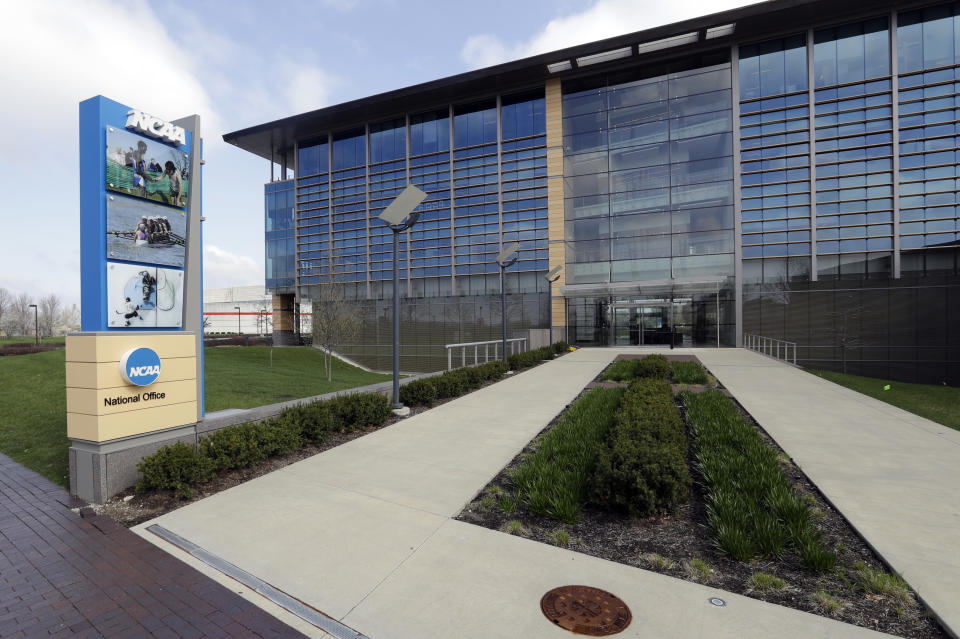NFLPA partners with rights group to help college athletes receive name, image, likeness compensation
The NFL Players Association has partnered with a college athletes rights group to pursue the best paths to name, image and likeness compensation for college athletes in the future.
The NFLPA, through its licensing subsidiary REP Worldwide, announced a joint venture with the National College Players Association (NCPA) on Monday in an effort toward advancing marketing and licensing opportunities for college athletes — including the distribution of broadcast rights.
“To date, college athletes’ group licensing and broadcast rights have been sold by schools, conferences, and the NCAA. These organizations take all revenues and profit derived off the athletes’ work without even acknowledging that athletes deserve a fair share,” the NFLPA and NCPA said in a press release. “Under this new partnership, the NFLPA and the NCPA will explore opportunities for merchandise, gaming and other officially licensed products. We will also review how recent developments impact television broadcast revenues in pursuit of fairness.”
Added NFLPA executive director DeMaurice Smith: “REP Worldwide was created to offer all athletes the same world class service that NFL players have when companies want to partner with athletes to market their likeness, image and personalities. We are proud to partner with the NCPA to offer this service to students who are also athletes. For the first time, a legislature has indicated that these students have rights just like everyone else and we support this continuing movement towards fairness.”
California passed NIL bill last month
The partnership — which could be good news for fans of the NCAA Football video games — comes a month after California passed a bill that will allow NCAA athletes in the state to profit from the use of their own name, image and likeness — a departure from the NCAA’s concept of amateurism that prohibits college athletes from being compensated in any way beyond their scholarships and cost-of-attendance.
The California bill, known as the Fair Pay to Play Act, is slated to go into effect on Jan. 1, 2023. But in the weeks that followed the signing of the California bill, states across the country have pursued similar legislation. That includes Florida, where Gov. Ron DeSantis said last week he supports a similar bill that would go into effect in July 2020 should it pass through the state House and Senate. Lawmakers in Pennsylvania are also considering legislation for 2020.
Last month, the NCAA said the California bill “would erase the critical distinction between college and professional athletics” and give the state’s universities “an unfair recruiting advantage” that would “result in them eventually being unable to compete in NCAA competitions.” After the bill was signed, the NCAA said changes made to its model should be done “on a national level through the NCAA’s rules-making process.”

NCAA group to release ‘set of principles’ on Tuesday
In May during the earlier stages of the bill, the NCAA formed a working group to “examine” name, image and likeness issues. The NCAA hoped California would delay consideration for the bill until officials discussed the issue with the working group slated to release a final report to the NCAA Board of Directors in October. According to CBS, however, the working group’s “final report” won’t be a report at all. Instead, a “set of principles” on name, image and likeness “will be presented on Tuesday.”
Big 12 commissioner Bob Bowlsby, a member of the working group,” told CBS that the group — after five months — is still in the early stages of discussions and plans to “adhere as close to the collegiate model as possible.”
"We are coalescing on a set of principles that adhere as close to the collegiate model as possible," Bowlsby said. "We'll be posing some questions to the Board of Governors about how they want us to proceed from here."
Bowlsby stressed that the working group's actions are preliminary in the process. Ohio State athletic director Gene Smith, the working group's co-chair, cautioned that Tuesday's release "won't be much."
"It's not going to be a short process," Bowlsby said. "There aren't going to be any answers on [Tuesday]. We actually, I think, came to a comfortable place for most of the people in the room."
California Gov: NCAA ‘not going to do the right thing’
After the decision to sign the bill into law became public, California Gov. Gavin Newson said the state essentially felt the need to force the NCAA’s hand and challenge the governing body’s long-standing stance on the issue.
“They’re not going to do the right thing on their own. They only do the right thing when they’re sued or they’re forced to do the right thing,” Newsom told the New York Times.
In a letter to the State Senate, however, Newsom said he is looking forward to reviewing the recommendations made by the NCAA working group, noting that the Jan. 1, 2023 commencement date was chosen to allow for potential adjustments to the law.
“SB 206 provides a three-year implementation window. If unintended consequences arise that negatively impact our colleges and universities, or our student-athletes, my administration will work constructively with the Legislature to address these issues,” Newsom wrote. “Ultimately, this is a fundamental matter of fairness and equity that is well past due.”
More from Yahoo Sports:

